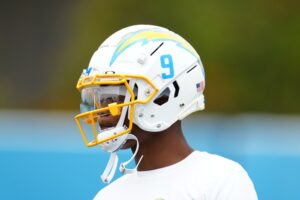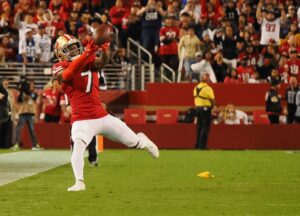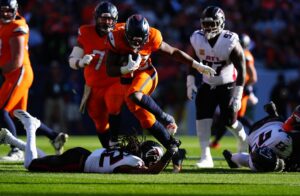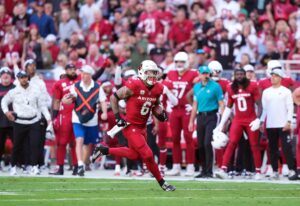Brett Favre and Aaron Rodgers are two of the most recognizable figures in Green Bay Packers history. Both have built lasting legacies that will be fondly remembered for years to come by many Packer and football fans alike. With their flair for the dramatic and great escapes and Super Bowl titles, in many ways the two are very similar. But if given the choice of either Favre or Rodgers, who would you take to lead your team? In this article, I’ll compare the two and break down which quarterback has the edge in different categories.
The Ultimate Packers Quarterback Debate: Brett Favre or Aaron Rodgers?
Arm Strength
I’ll start off with a common attribute that is frequently looked for when scouting quarterbacks: arm strength. While it is no secret that Favre had an absolute cannon, Rodgers has a rocket of an arm himself. Both are able to throw upwards of 60-70 yards and sometimes even farther. Both quarterbacks have shown off their god-like arm strength against the Detroit Lions in particular. In the 1993 NFC Wild Card against the Lions in the Silverdome, Favre rolled to his left only to throw back across the field to the corner of the end zone from the Lions’s 40-yard-line, where Sterling Sharpe was hit in stride for the winning score in what was later dubbed “Favre to Sharpe.”
Rodgers’s moment came at Ford Field in 2015 when, after trailing by 20 in the third quarter, Rodgers led his team back only to get one last chance with the ball inside his own 35-yard-line down by 2. Rolling to his right and given a running start, Rodgers unleashed a bomb that fell right into the leaping arms of Richard Rodgers for the winning score in what was eventually dubbed the “Miracle in Motown.” While both have shown off their ridiculous arm strength, Favre was much more well-known for his arm and had the ability to dislocate the fingers of his receivers with how hard he threw. I’ll give him the edge in this category.
Edge: Favre
Accuracy
Both quarterbacks have made their fair share of impressive throws, but when Rodgers is on top of his game, there isn’t a throw he can miss. His immaculate placement of the football is so precise and articulate that it’s as if you’re watching an artist paint or a poet write. In short, Rodgers is a football maestro. He owns a career 65.1 percent completion percentage and has thrown a mere 72 interceptions in his career, compared to Favre’s 62 percent completion percentage and 336 interceptions. That’s not to say that Favre was never an accurate quarterback who could exhibit incredible placement of the ball, but there really aren’t many quarterbacks in NFL history who exceeded Rodgers in this category.
Edge: Rodgers
Footwork/Pocket Presence
While Rodgers may be well known for his ability to put the ball on a dime, he might be even better known for his countless “great escapes” and mobility in the pocket. Even when he’s not hitting his receivers, you can always count on Rodgers to be able to buy time and escape the rush. While other players may see their passer rating fall when facing the blitz, Rodgers actually sees his go up, which is a big reason why he’s one of the least blitzed quarterbacks in the NFL.
Favre, on the other hand, doesn’t fare as well in this category, although he’s certainly made his fair share of “great escapes.” Oftentimes, Favre would make bone-headed decisions when under pressure, throwing balls up into double coverage or desperately rifling balls into tight windows, which is a big reason why he’s the NFL’s all-time interception leader. He would attempt to scramble out of blitzes only to lose even more yards, as well. On top of that, he would often throw off of his back foot and whip the ball down the field without setting his feet. No disrespect to Favre, but this is a category easily won by Rodgers.
Edge: Rodgers
Leadership/Intangibles
This is a pretty tight category between Rodgers and Favre. Rodgers came into the NFL with an incredible amount of knowledge in his rookie season and was a scholar of the most detailed ins and outs of the game. He expanded on that throughout his time in the NFL by sitting behind Favre and then getting experience of his own, to the point where Rodgers regularly is able to make smart reads, including the ability to be able to draw off opposing defensive linemen with the hard count. Of course, before Rodgers made hard counts his thing, he learned from the original master of the hard count in Favre. Favre, unlike Rodgers, came into the NFL with limited ability to make smart reads and tell defenses apart, instead relying on his rocket arm to bring home victories.
Over the years, however, Favre became an exceptional pre-snap quarterback as he gained more and more experience. As his intangibles grew, so did his ability to rally his team. Favre was always a very vocal leader in the huddle and the locker room, and many players on the team looked up to him. Rodgers on the other hand was never that great at being a leader on the team, often taking a backseat to players such as Julius Peppers or Mike Daniels.
In recent years, however, Rodgers has taken on more of a leadership role as he’s grown older and the players around him have grown younger. This was especially evident last season when he repeatedly put blame on himself for losses in the early part of the season and expressed full confidence in his team when he made his now-famous “run the table” prediction. This category is a close one, but I think the edge lies with Favre.
Edge: Favre
Legacy
When Brett Favre came into the NFL, the Packers were at one of their lowest points in franchise history. After stumbling to 4-12 in 1991, the Packers fired Lindy Infante and then hired a new general manager named Ron Wolf, who took a chance by trading away a first-round-pick for an unproven and undisciplined Favre. Favre managed to turn the Packers around, getting them to the playoffs by 1993 and by 1995 the Packers had assembled the pieces for a title run, which they would accomplish in the 1996/97 season. Favre finished his career with numerous NFL records and was enshrined to the Pro Football Hall of Fame in 2016.
Rodgers owns numerous NFL records as well and has a Super Bowl ring of his own, as well as career statistics that match up with all-time greats. Rodgers still has plenty left in the tank and could possibly challenge Favre’s franchise and NFL records when all is set and done, and could add a few more rings should he ever get backed up with a competent defense. But at the moment, Favre’s legacy vastly outshines Rodgers’, though Rodgers could someday overtake Favre in this category.
Edge: Favre
Conclusion
Packers fans are certainly indebted to Favre and there are many who still count him as their favorite quarterback ever. He’s certainly one of the greatest quarterbacks and greatest football players in NFL history. His passion for the game was unrivaled by anyone and his toughness was divine, as evident by his NFL-record 297 consecutive starts (321 including playoffs).
But along came Aaron Rodgers, and suddenly there was another player in the discussion for greatest Packers quarterback of all time. He makes plays and throws that few, if any, quarterbacks are able to accomplish on a consistent basis. He’s a God amongst men, and there are days where it seems as though everyone on the field is playing to the will of Rodgers. He rarely makes mistakes and at the same time he has the ability to place footballs on a dime. He’s converted three Hail Marys in his career, and he’s probably the only NFL quarterback to ever do it multiple times, let alone three.
Favre will always have a special place in the hearts of Packer fans, and even though he has an edge in three of the five categories on this list, Rodgers edges him out. At the end of the day, Rodgers protects the football much better and doesn’t take as many chances, even though on occasion those risks Favre took would end up winning Green Bay the game.
Rodgers over Favre






